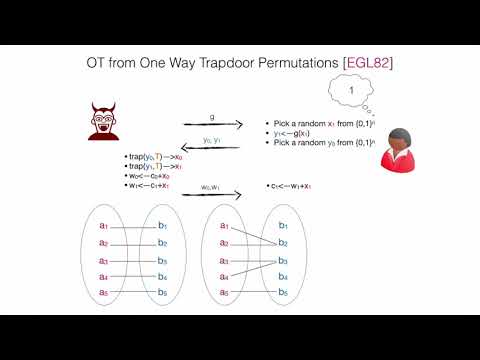CryptoDB
Oblivious Transfer from Trapdoor Permutations in Minimal Rounds
| Authors: | |
|---|---|
| Download: | |
| Abstract: | Oblivious transfer (OT) is a foundational primitive within cryptography owing to its connection with secure computation. One of the oldest constructions of oblivious transfer was from certified trapdoor permutations (TDPs). However several decades later, we do not know if a similar construction can be obtained from TDPs in general. In this work, we study the problem of constructing round optimal oblivious transfer from trapdoor permutations. In particular, we obtain the following new results (in the plain model) relying on TDPs in a black-box manner: – Three-round oblivious transfer protocol that guarantees indistinguishability-security against malicious senders (and semi-honest receivers). – Four-round oblivious transfer protocol secure against malicious adversaries with black-box simulation-based security. By combining our second result with an already known compiler we obtain the first round-optimal 2-party computation protocol that relies in a black-box way on TDPs. A key technical tool underlying our results is a new primitive we call dual witness encryption (DWE) that may be of independent interest. |
Video from TCC 2021
BibTeX
@article{tcc-2021-31531,
title={Oblivious Transfer from Trapdoor Permutations in Minimal Rounds},
booktitle={Theory of Cryptography;19th International Conference},
publisher={Springer},
doi={10.1007/978-3-030-90453-1_18},
author={Arka Rai Choudhuri and Michele Ciampi and Vipul Goyal and Abhishek Jain and Rafail Ostrovsky},
year=2021
}

